| dc.description.abstract | Sub-Saharan Africa has a higher prevalence of undernutrition, which is the underlying cause
of stunting and underweight problems in children. Undernutrition is generally caused by
insufficient intake of nutrients; in Africa, it’s mainly due to over-reliance on plant-based staple
diets which contain inadequate amount of essential nutrients. Spirulina is a naturally abundant
microalgae with great nutritional values and could be utilized to fortify diets to enhance human
health. Therefore, this study evaluated nutrient content, bioavailability and safety of locally
found Spirulina products, focusing specifically in East Africa, to enable possible food-based
strategic interventions aimed at improving human nutrition in the region. A field survey was
conducted to identify local Spirulina producers in East Africa and obtain samples. A total of
54 mice were used in evaluating the nutrient bioavailability and safety in vivo. A randomized
control trial research design was used to select and allocate mice into treatment groups.
Randomly grouped mice were separately fed three diets: control (basal), test (15% Spirulina
powder blended with 85% basal diet) and standard (basal diet supplemented with standard
nutritional supplements). The test and standard diets had equivalent nutrient content to enable
direct comparison of results. Nutrients content analyses showed that a 100 g analyzed Spirulina
samples contains 70 g protein, 82 mg iron, 84.5 mg zinc, 1302 mg calcium, 628 mg
phosphorous, 27 𝜇g vitamin A, 246.8 𝜇g vitamin B9, 3.99𝜇g vitamin B12, 1.92 mg QE/g total
flavonoid and 2.99 mg GAE/g total phenolic. The nutrients bioavailability from the control diet
was statistically lower than those of test and standard diets, whose results were comparable.
After the feeding experiment, mice had no significant differences in their serum aspartate
aminotransferase (AST), alanine aminotransferase (ALT), cystatin C and troponin I
concentrations, indicating that the studied concentrations of control, test and standard diets had
no adverse effect on critical organs (liver, heart, or kidney) of the mice. These results indicate
the safety of Spirulina and reinforce its importance in reducing undernutrition in humans. | en_US |

